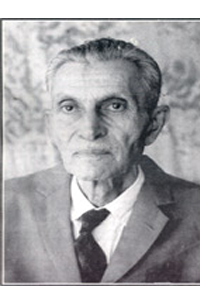J. K. Mehta: Difference between revisions
Appearance
Content deleted Content added
→Key ideas: Needs specification and citation, and just a "mention" is not needed. |
→top: Sourcing is pretty thin and seems just blurbs and brief mentions, or sources by the subject. Notability isn't clearly established. |
||
| Line 1: | Line 1: | ||
{{notability}} |
|||
{{Use dmy dates|date=December 2020}} |
{{Use dmy dates|date=December 2020}} |
||
{{Infobox person |
{{Infobox person |
||
Revision as of 03:51, 7 November 2021
The topic of this article may not meet Wikipedia's general notability guideline. |
J. K. Mehta | |
|---|---|
 | |
| Born | Jamshed Kaikhushro Mehta[1] 14 December 1901 |
| Died | 9 August 1980 (aged 78)[2] |
| Alma mater | University of Allahabad (PhD) |
| Occupation(s) | Economist, Philosopher, Professor & Author[3] |
Jamshed Kaikhusro Mehta, known professionally as J. K. Mehta (14 December 1901 – 9 August 1980) was an Indian philosopher and economist. He was born to K. M. Mehta in Rajnandgaon in 1901. He completed his graduation from Moir Central College and attended University of Allahabad for post graduation.
Work and philosophy
Key ideas
J. K. Mehta is known for his idea of wantlessness.[specify] In 1931, he discovered the theory of marginal revenue.[citation needed] He was very inspired by Mahatma Gandhi and spread the Gandhian Theory of Economics.[4]
See also
List of University of Allahabad alumni
Bibliography
- Economics of Growth (First Edition: 1964)[5]
- A Philosophical Interpretation of Economics[6]
- Rhyme, rhythm and truth in economics[7]
- The elements of economics mathematically interpreted, (First Edition: 1932)
- Gandhian Thought [8]
References
- ^ "Remembering J.K.Mehta on his 34th Death Anniversary". Active India.
- ^ "Remembering J.K.Mehta on his 34th Death Anniversary". Active India.
- ^ "The Indian Journal of Economics - University of Allahabad". www.indianjournalofeconomics.com.
- ^ "ISBN 9780836413885 - Gandhian Thought". isbnsearch.org.
- ^ Mehta, J. K (1964). Economics of growth. Asia Pub. House. OCLC 13799094.
- ^ Macfie, A. L. (1963). "Review of A Philosophical Interpretation of Economics". The Economic Journal. 73 (289): 106–108. doi:10.2307/2228409. JSTOR 2228409.
- ^ Mehta, J. K (1967). Rhyme, rhythm and truth in economics. Asia Pub. House. OCLC 473963.
- ^ "ISBN 9780836413885 - Gandhian Thought". isbnsearch.org.
